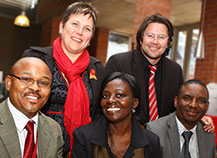Latest News Archive
Please select Category, Year, and then Month to display items
05 June 2018
Photo Supplied
 Archaeological excavations in the Wonderwerk Cave, north of Kuruman in the Northern Cape.
Archaeological excavations in the Wonderwerk Cave, north of Kuruman in the Northern Cape.
Research fellow Dr Lloyd Rossouw from the Department of Plant Sciences at the University of the Free State (UFS) recently published an article in the Nature Ecology and Evolution journal with Dr Michaela Ecker from the University of Toronto as lead author, and Dr James Brink, research fellow at the UFS Centre for Environmental Management. The findings described in “The palaeoecological context of the Oldowan-Acheulean in southern Africa” provides the first extensive paleoenvironmental sequence for the interior of southern Africa by applying a combination of methods for environmental reconstruction at Wonderwerk Cave, which have yielded multiple evidence of early human occupation dating back almost two million years ago.
Where water once was
The Wonderwerk Cave is found north of the Kuruman hills (situated in Northern Cape) a 140m long tube with a low ceiling. The surroundings are harsh. Semi-arid conditions allow for the survival of only hardy bushes, trees, and grasses. But during the Early Pleistocene, stepping out of the Wonderwerk Cave you would have been greeted by a completely different site, the researchers found. Using carbon and oxygen stable isotope analysis on the teeth of herbivores (Dr Ecker), fossil faunal abundance (Dr Brink), as well as the analysis of microscopic plant silica remains (phytoliths) excavated from fossil soils inside the cave (Dr Rossouw), the results show that ancient environments in the central interior of southern Africa were significantly wetter and housed a plant community unlike any other in the modern African savanna.
What difference does it make?
While East African research shows increasing aridity and the spread of summer-rainfall grasslands more than a million years ago, the results from this study indicate an interesting twist. During the same period, shifts in rainfall seasonality allowed for alternating summer and winter-rainfall grass occurrences coupled with prolonged wetlands, that remained major components of Early Pleistocene (more or less the period between one and two million years ago) environments in the central interior of southern Africa. That means our human ancestors were also living and evolving in environments other than the generally accepted open, arid grassland model.
Unit for Students with Disabilities impresses
2012-08-10
 |
MUT learns from UFS: From the left, back: Ms Hetsie Veitch, Head of the Unit for Students with Disabilities at the UFS; Mr Rudi Buys, Student Dean at the UFS; front: Mr Mthoko Ntuli, Student Development Officer; Ms Lindiwe Chamane, Student Guidance Officer; and Dr Sibongiseni Ngcamu, Coordinator of Organisational Development (all from the MUT).
10 August 2012 |
Staff of the Mangosuthu University of Technology (MUT) in KwaZulu-Natal visited the Bloemfontein Campus of the University of the Free State (UFS) to gain insight into the working of the Unit for Students with Disabilities. They visited the campus on recommendation of the Deputy Minister of Women, Children and People with Disabilities, Ms Hendrietta Ipeleng Bogopane-Zulu.
In the interaction between the two institutions, it was agreed that the Unit for Students with Disabilities would assist the MUT in drawing up a policy for students with disabilities, as well as on how to make residences more accessible and to manage support services for the students. The two institutions also agree to closer collaboration of student governance and leadership development as well as international students.
Ms Hetsie Veitch, Head of the Unit for Students with Disabilities, said this was not the first time that the UFS was used as a benchmark. She said the UFS is held in high regard because every disabled student’s needs were specifically addressed. “We follow a holistic approach so that students with disabilities have the same student life and experience as any other